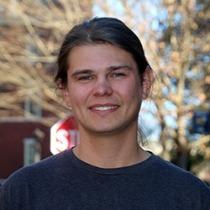
Trenton Charlson
What is your next adventure?
I've accepted a job as a turbo machinery engineer at SpaceX. I'll be working on the Raptor engine.
What about your next adventure are you most looking forward to?
I'm looking forward to working full-time on rockets, as opposed to it being a hobby. At Tech, I was very involved with the Yellow Jacket Space Program - putting in 40 to 60 hours a week on the rocket engine we built. That was entirely outside of any classes. That's what I want to be doing full-time.
Did you have any previous co-op, internship, or research experience in this area?
I tried working as a research assistant at GTRI, but ultimately, I found that it spread me too thin. I didn't have enough time to work on things that I really wanted to do. A friend of mine who worked at SpaceX reached out to me and asked me to send him my resume because he thought they [SpaceX] would like what I had to offer. Well, I got the job before I interviewed for it. I started out as a propulsion component engineering intern, working on valves for the Falcon 9 Rocket. My job was not to design them, but to make sure they qualified for re-use. This put me in the role of being a 'responsible engineer' -- someone who knows every last detail about a particular component. My second internship was in turbo machinery for the Raptor, and that worked out well. I'm heading back there after I graduate.
How did your educational experience at Georgia Tech help you to achieve your goals?
At Tech, I found a concentration of other young adults who shared my passion for building really amazing things. It was great. In high school, I had built robots competitively and I had cooked rocket propellant in my garage - not well, but I did it. But I was tinkering for the sake of tinkering because that's all I could do. At Tech, there are things like the Yellow Jacket Space Program, where we just hot-fire tested a liquid rocket engine. Freshman year, I joined the Robo Jackets Battle Bots team and met my best friend, from ME, who had the same inclinations to do crazy but science-y things.
He had done something with Tech's Mini 500, so he had an old tricycle. Me, I had stopped by an outlet store to pick up some socks one day, and I walked out with a chainsaw -- not because I wanted a chainsaw, but because it had a really cheap engine. We decided to attach the chainsaw engine to the tricycle and, well, it worked. After that we decided we'd try to motorize one of those electric cars that toddlers drive. I had another leftover motor and we found one of those little pink Barbie Jeeps on Craigslist, and that worked, too. It went viral, actually.
What advice would you give to an underclassman who would like to follow the same path?
It's cliche advice, but it's true: do what makes you happy. If you need to know something and you have the intelligence to learn it, go for it. And then keep going. That's what I did.
I took an unconventional track for a Tech student: I didn't do research. Compared to building rockets, rocket engines, and Battle Bots, research was a waste of my energy. I like doing hands-on projects. I decided after awhile that I wasn't going to be happy doing straight research. It wasn't going to lead me to the career I wanted. The role I am going to take at SpaceX when I leave is in development, where I will find problems and design solutions. That's what I learned to do with the [Yellow Jacket Space Program] rocket engine that we just tested: I started with an idea, created a design, built it, and tested it.
That corresponds to what makes me happy.